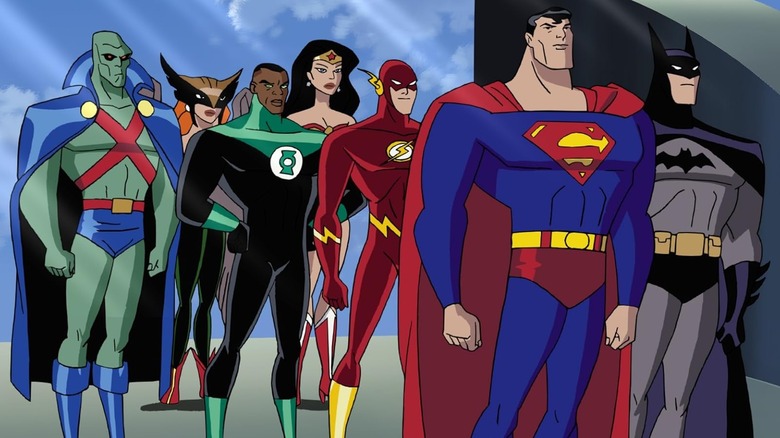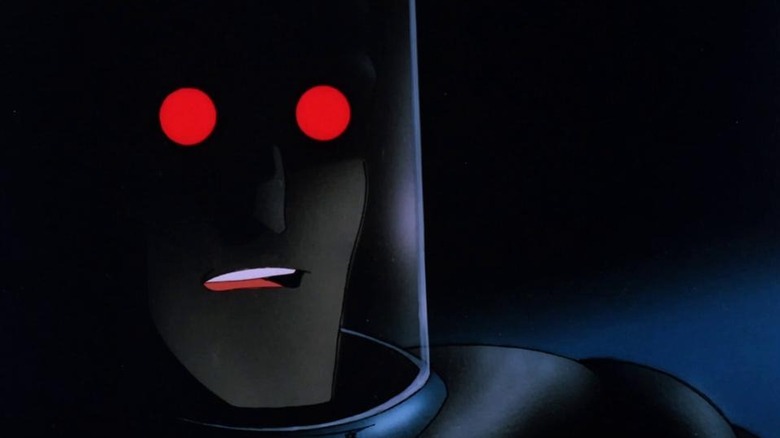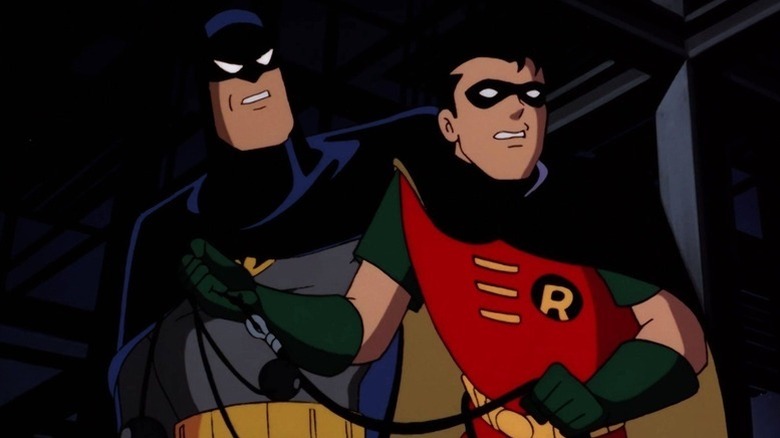The Best Superhero TV Show Of All Time, According To IMDb
We may receive a commission on purchases made from links.
What's the best superhero TV show? Satirical gorefest "The Boys" has been a smash hit, and in 2024, Marvel Studios released one of its best projects ever with "X-Men '97." But for a lot of other geeks, the answer to this question is still one of the classics.
For as much stock as you can put in IMDb, the site's list of highest user-rated TV shows puts "Batman: The Animated Series" in 24th place. With a rating of 9/10, it's the highest ranking superhero program on the list. "Batman" is also the sixth-highest ranking animated series after "Avatar: The Last Airbender" (which also featured Mark Hamill voicing a super-villain), "Bluey," "Fullmetal Alchemist: Brotherhood," "Rick and Morty," and "Attack on Titan." (Meanwhile, the season 1 finale of Viking anime "Vinland Saga" is the highest-rated animated TV episode on IMDb.)
Created by Bruce Timm and Eric Radomski, "Batman: The Animated Series" debuted in 1992 and ran for 85 episodes. (Or 109, if you count "The New Batman Adventures.") The show spawned a whole DC Animated Universe, and its spin-off film, "Batman: Mask of the Phantasm," is likewise a classic in its own right.
The newest Batman cartoon, itself created by Timm and titled "Batman: Caped Crusader," uses a similar style and storytelling approach as "The Animated Series" but with updated character designs and a 1940s setting. So, why is a mere children's cartoon like "Batman: The Animated Series" still revered more than 30 years later? Is it just in the right phase of the nostalgia cycle? Sure, that's part of it, but it also has quality craftsmanship that's rare in superhero cartoons made before or since.
In the behind-the-scenes book "Batman: Animated," Timm writes reveals the secret to the show's sucess: "There are no weak links in our chain," meaning the series' writers (from producer Alan Burnett and the prolific Paul Dini to guest writers), animators, voice cast, composer Shirley Walker, voice director Andrea Romano, et al. were all at the top of the game to save "Batman" from being "just another mediocre cartoon."
These creatives had passion for the material (but also self-awareness) and strived to make a mature Batman cartoon when no such thing had previously existed. "Batman: The Animated Series" took as much influence from film noir as it did from Adam West, yet never forgot its target audience even during the heavier episodes. The show was serious, but not try hard self-serious like some lesser "Batman" projects. That perfect balance made a near-perfect series.
Batman: The Animated Series did right by its villains
We here at /Film consider "Batman: The Animated Series" to be the definitive rendition of both Batman and all his villains. That last part is extra important, because the villains are a key part of what makes this show so good. When people claim Batman has the best rogues gallery of any comic book superhero, part of that is because "The Animated Series" did such a good job spotlighting them all.
Of course, there's the Joker, voiced by Mark Hamill in the role that officially proved he had more in him than Luke Skywalker. Even with age restrictions of a TV-Y7 cartoon, Hamill's Joker was both funny and scary, sometimes in the exact same scene. (Just check out his answering machine.) The episode "Joker's Favor," where he stalks a hapless man who unknowingly cussed him out on the road, brings the Joker's evil down from enjoyable cartoon hijinks to real, terrifying sadism.
Next to Joker stood the show's most famous original creation, his sidekick Harley Quinn (Arleen Sorkin). If she's overexposed these days, it's only because she popped off the screen so well in "Batman: The Animated Series."
"Batman" also rarely settled for "cartoon villains" in the sense of flat characterization. Many of the super-villains were pitiable or downright tragic, like Two-Face, Clayface, and most successfully Mr. Freeze. Freeze's debut episode "Heart Of Ice," which equipped the villain with a rewritten backstory and robotic redesign from future Hellboy creator Mike Mignola (who knows a thing or two about Batman), won the show a Daytime Emmy for Outstanding Writing in an Animated Program.
The show also knew that, sometimes, all you need for a great villain is a great voice. Andrea Romano managed to recruit some legendary guest stars, including Adrienne Barbeau as Catwoman, David Warner as Ra's al Ghul and, in "New Batman Adventures," B-movie legend Jeffrey Combs as the Scarecrow.
The villain ensemble of "Batman" was so strong that the writers began to pen episodes all about them, such as "Almost Got 'Im" (when they swap Batman stories while paying cards) and "Trial" (where they put a captured Batman on trial before his costumed peers).
The Animated Series showed a Batman with a heart
To reverse an old cliché, good villains mean nothing without a strong hero to face them. "Batman: The Animated Series" also gave us the definitive and most endearing adaptation of the Caped Crusader himself. Batman's characterization strikes the same just right balance of dark and light as the overall tone of the series.
The animated Batman's soul rested within Kevin Conroy; he may no longer be with us, but he still is the voice for Batman without dispute. Conroy was a gay man and, when he got the part of Batman, was still in the closet for his career's sake. In 2022, Conroy wrote a short comic titled "Finding Batman," explaining how having to wear a mask in his own life prepared him to voice Batman:
"It seemed to roar from 30 years of frustration, confusion, denial, love, yearning... yearning for what? An anchor. A harbor. A sense of safety, a sense of identity. Yes, I can relate. Yes, this is terrain I know well. I felt Batman rising from deep within."
Conroy's Batman wasn't one that only inspired fear, but also one that children (or adults who first watched him at a younger age) could look up to, and who was allowed to be vulnerable like in Conroy's greatest Batman moment of all. Some particular highlights include "Nothing to Fear," where Batman is haunted by the disapproving spirit of his father, only to vanquish it with a now immortal line: "I am vengeance! I am the night! I am Batman!"
In "Perchance To Dream," Bruce Wayne awakens in a world where he was never Batman and his parents are still alive. The normally in-control Batman is bewildered, and ultimately can't deny when something is too good to be true. In "I Am The Night," we see a rare self-loathing side of Batman, for he feels that he still hasn't done enough despite all his dedication and sacrifices.
The two-parter "Robin's Reckoning" mostly stars Batman's Boy Wonder sidekick as he comes face-to-face with his parents' killer Tony Zucco, but Batman/Conroy has a strong supporting part. I've never forgotten his final line in the episode, when he admits he was scared that Robin might get himself killed running off after Zucco.
This Batman even sees the light in the bad guys (well, most of them). Just watch "Two-Face" or "Baby Doll" or "Harley's Holiday," where he comforts a semi-reformed Miss Quinn by reminding her we all have bad days. "Nice guys like you shouldn't have bad days," replies a touched Harley.
I see in Conroy's Batman the same ethos that Peter Cullen draws on when voicing Optimus Prime in "Transformers" — "Be strong enough to be gentle" — and from that came the best Batman ever.
"Batman: The Animated Series" is streaming on Prime Video.


